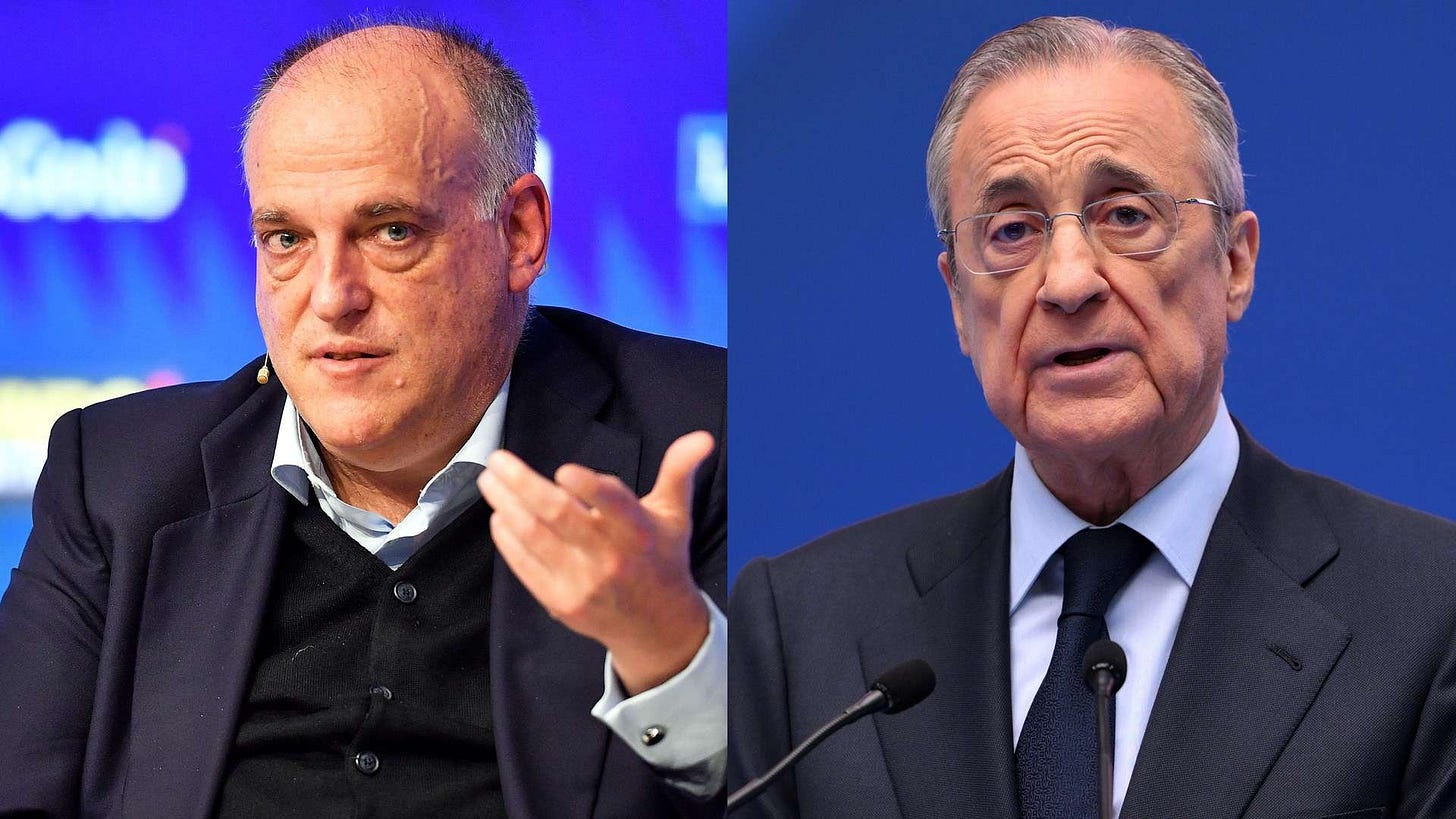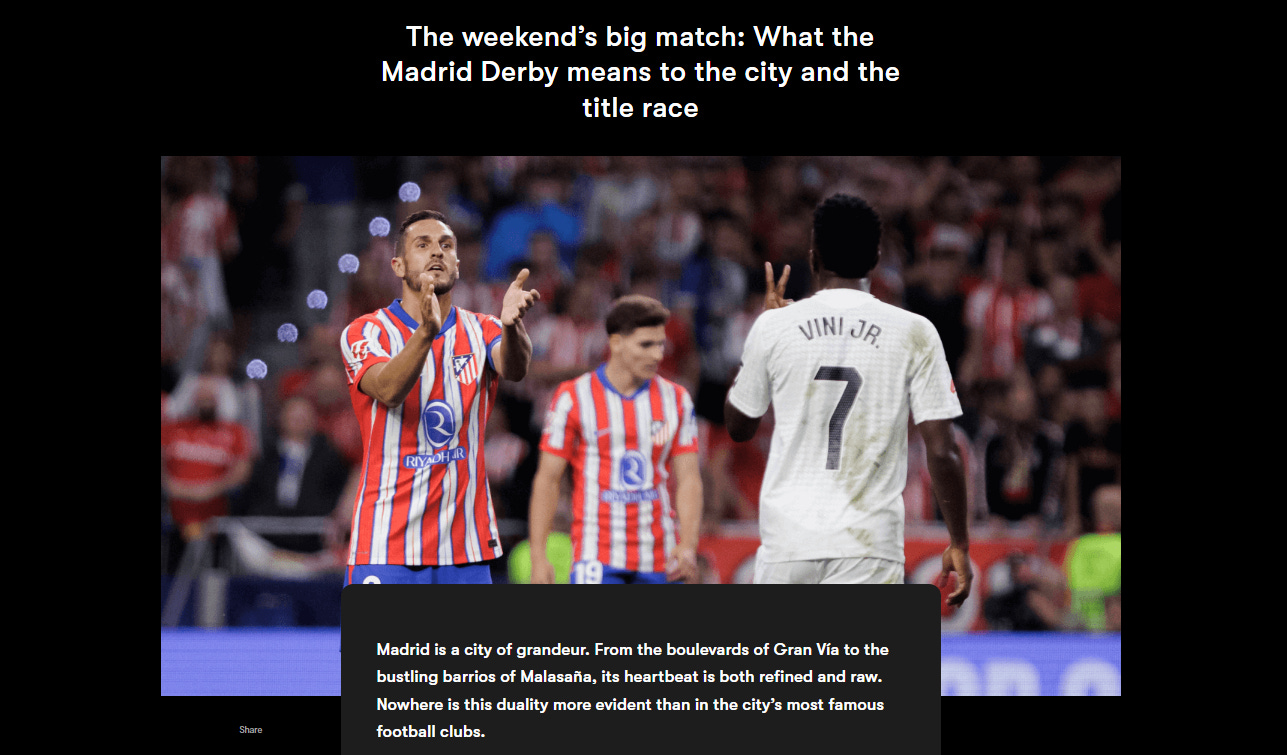Real Madrid vs La Liga: A Long Power Struggle Enters a New Chapter
How the battle over refereeing decisions reflects deeper tensions between Spain’s biggest club and its league authorities.
Today’s Madrid Derby should be about football. Instead, the build-up has been dominated by a war of words and legal threats between Real Madrid and La Liga.
What started as frustration over refereeing decisions in last week’s defeat to Espanyol has escalated into something much bigger. The club has filed an official complaint, La Liga president Javier Tebas has lashed out, and Carlo Ancelotti has been left playing diplomat.
But this isn’t just a one-off controversy. This is the latest chapter in a long battle for power between Spain’s biggest club and the league it dominates.
The immediate trigger for Real Madrid’s fury was two refereeing decisions in their 1-0 loss to Espanyol. A dangerous tackle on Kylian Mbappé was only punished with a yellow card, and a Vinícius Júnior goal was controversially disallowed. Madrid, in characteristic fashion, responded with an official complaint, calling the officiating “manipulative” and demanding access to the VAR audio recordings.
La Liga chief Javier Tebas didn’t hold back. He accused Madrid of constructing a “victimhood” narrative, called their response an “overreaction,” and even suggested the club had “lost their minds.”
To escalate matters further, La Liga is now preparing to file a complaint against Madrid’s board.
It’s easy to frame this as a refereeing dispute, but this is about more than a few calls going against Madrid. It’s about who holds the power in Spanish football. And if history has taught us anything, it’s that Real Madrid does not take well to being dictated to.
Real Madrid is more than just a football club. It is Spain’s most decorated sporting institution, a global powerhouse, and, in many ways, a symbol of establishment power that creates a power perception difference between the club and the league.
When La Liga introduced financial fair play rules, Madrid pushed back. When broadcasting rights were centralized in a way that reduced their bargaining power, Madrid resisted. The Super League fiasco was another prime example—while Tebas has fought to protect La Liga’s structure, Madrid (alongside Barcelona) has continued to push for a breakaway league.
The personal dynamic between Javier Tebas and Florentino Pérez has only intensified this power struggle. Tebas, who has been La Liga president since 2013, has positioned himself as a reformist, determined to modernize Spanish football and break the traditional dominance of its biggest clubs. While Pérez, Madrid’s long-serving president, has played the role of the old guard, seeking to maintain Madrid’s privileged position.
Tebas sees Madrid’s complaints as an attempt to undermine the credibility of the league. Madrid sees Tebas as a president who has overstepped his authority and unfairly targeted them. Neither side seems to be backing down.
There’s also a deeper cultural divide at play here. Across Spain, there’s a perception that Madrid enjoys favouritism—from referees, the Spanish Football Federation, and even the government. Whenever they complain about decisions going against them, the response from rival fans is often the same: “Cry me a river.”
That’s why Atletico Madrid’s jabs on social media this week have resonated so strongly. Their posts have mocked Madrid’s perceived entitlement, playing into a long-standing belief that the capital’s biggest club has always had the system on its side. For fans outside Madrid, this feels like a rare moment when power is shifting against them—and they’re enjoying every second of it.
Madrid’s complaint is unlikely to lead to immediate structural reform. But it does set the stage for further clashes between the club and La Liga. If the league pursues legal action against Madrid’s board, the animosity will only deepen. And with Madrid still backing the Super League project, the long-term battle for control of Spanish football is far from over.
For now, though, Madrid has a more immediate concern. Beating Atletico in today’s derby would send a stronger message than any official complaint. After all, in football, power ultimately belongs to the team that wins.
Thanks for reading, David Skilling.
Follow me on LinkedIn | X | Instagram | Bluesky
Check out my article about what this derby means to the city of Madrid - FotMob
A lot gets written about El Clasico but the Derbi Madrileño is another rivalry worth reading about.
Here’s an excerpt
This derby isn’t just about Madrid; it’s about the soul of Spanish football. A Real Madrid victory reinforces the natural order, a kingdom led by an untouchable dynasty. An Atlético win signals a continued shift in power and a statement to the world that they’re not to be underestimated. The result will ripple beyond Spain, shaping the narrative of La Liga’s competitiveness in a season where the world is watching closely.
Read the rest here on FotMob
If you know someone who’ll enjoy this article, please share it with them.





